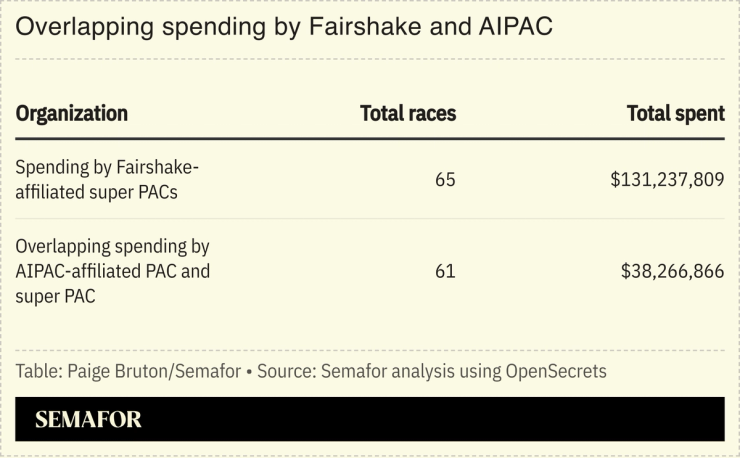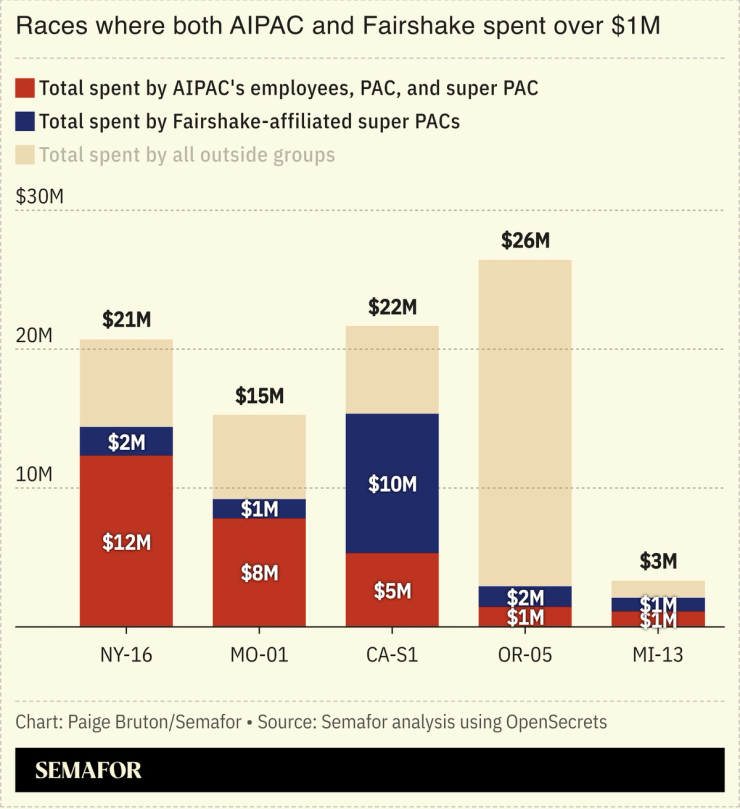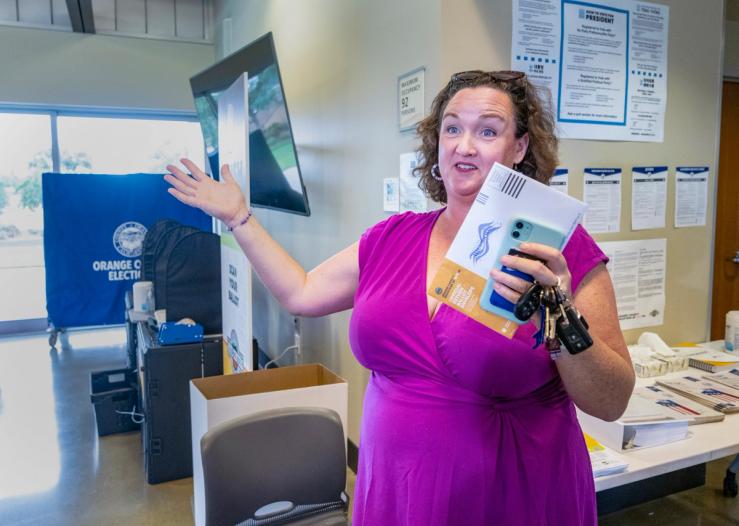The Scoop
The cryptocurrency industry stormed onto the political scene in 2024, gaining a reputation as a kingmaker through a trio of super PACs, known collectively as Fairshake, that helped it elect dozens of friendly members of Congress.
But its rapid rise to electoral heavyweight didn’t happen in a vacuum: Some of its most attention-grabbing victories came when it joined races where the American Israel Public Affairs Committee was also playing.
Of the 65 congressional races that Fairshake-affiliated super PACs spent in for the 2024 cycle, 61 of them also featured spending from AIPAC’s employees, its PAC, or its super PAC, United Democracy Project, according to a Semafor analysis of OpenSecrets data.
All 29 races targeted by the primary Fairshake super PAC, which spent about $40.66 million, also saw spending by AIPAC. In the same 29 races, AIPAC’s employees, its PAC, and its super PAC spent a combined $32.09 million.
Fairshake says it decides who to back based on candidates’ support for digital assets policy. Still, some crypto insiders are well aware of the Fairshake-AIPAC spending correlation — and they’ve privately questioned whether the industry made such a splash during its debut election season because it sought to build clout by spending in step with AIPAC.
They point to Fairshake’s opposition to candidates who didn’t otherwise seem obvious targets for digital assets advocates, like Katie Porter of California.
A person with direct knowledge of Fairshake’s internal deliberations told Semafor that its executives “were always talking about what AIPAC will do or what AIPAC won’t do” in specific races.
“They definitely take a lot of their cues from AIPAC, and I think they went into a lot of races that didn’t make sense as a result,” this person added. “And it was largely to get the headline, because they knew it might be a sure thing.”

Correlation is not causation, and Fairshake’s allies describe any alignment between their spending and AIPAC’s as pure coincidence. Fairshake has said repeatedly that it determines its spending solely based on whether a candidate will help get industry-friendly legislation enacted.
“This is all BS, and anyone who was in that room wasn’t in any room with Fairshake, ever,” a Fairshake spokesperson said.
In addition, there are key differences between PACs, which can give directly to candidates, and super PACs, which cannot; AIPAC endorsed a total of 361 candidates, meaning there was bound to be some overlap.
AIPAC did not respond to a request for comment.
The Fairshake super PACs are now preparing to unleash a war chest of more than $140 million on the midterm elections, after several of the congressional allies they helped elect last year wound up on committees that drafted a just-enacted law that set rules for stablecoins.
Digital assets firms are seeking more than just stablecoin certainty; they also want Congress to permanently enshrine President Donald Trump’s crypto-friendly regulatory regime.
They’re making 2026 campaign spending decisions against that backdrop.
In this article:
Know More
The Fairshake super PAC and the affiliated Protect Progress and Defend American Jobs super PACs would eventually invest in four of the six House races that AIPAC’s super PAC spent the most on.
UDP spent $9.87 million against Jamaal Bowman of New York starting May 13, 2024; Fairshake spent $2.08 million starting June 14. UDP spent $5.24 million against Cori Bush of Missouri starting May 29; Fairshake spent $1.41 million starting July 24.
UDP spent $1.72 million in support of Jimmy Gomez of California Oct. 7; Protect Progress spent $511,329 the same day. UDP spent $1.53 million against John Hostettler of Indiana starting April 4; Defend American Jobs spent $504,020 in support of his opponent, Mark Messmer, starting on May 1. (AIPAC’s employees and PAC also spent on all of the above races.)
“Apart from a couple of places … they didn’t have some brilliant strategy that was so groundbreaking or original,” a second person with direct knowledge of Fairshake’s internal deliberations told Semafor, adding that the crypto super PACs were “pretty much just drafting off of” AIPAC.

In closely contested House races in Arizona, Texas and Washington, Fairshake played a pivotal role by spending far more — and earlier — than AIPAC.
But the biggest divergences in 2024 between Fairshake and AIPAC came in four Senate races: battleground-state fights in Ohio, Arizona, and Michigan, plus California’s Democratic primary.
Ohio was the most notable break. The Fairshake-affiliated super PAC Defending American Jobs spent $40.13 million to help now-GOP Sen. Bernie Moreno’s successful bid to defeat former Democratic Banking Chair Sherrod Brown.
But AIPAC did not spend against Brown, who has received more than $1.22 million from pro-Israel groups in the past.
“Literally, the [crypto] industry put Bernie Moreno in the Senate,” current Senate Banking Chair Tim Scott, R-S.C., said at a digital assets conference in Wyoming earlier this week.
In Arizona and Michigan, Fairshake’s vehicles spent about $20 million in total to help now-Democratic Sens. Ruben Gallego and Elissa Slotkin, respectively. AIPAC spent comparatively tiny amounts on their behalf.
It was a different story in California, where the Fairshake super PAC showed off its power by spending about $10 million to knock the progressive Porter out of the Democratic primary for its open Senate seat.
Porter, who has since won the backing of former Ripple CEO Chris Larsen, was caught off-guard: While she is a staunch proponent of financial regulation, she hadn’t taken any real position on the industry at that point.
AIPAC didn’t spend against Porter, according to OpenSecrets, but it did boost her rival and the eventual winner of the race — giving $5 million to the super PAC of Democrat Adam Schiff, and another $311,663 to Schiff himself.
“They’re trying to obviously stretch dollars … by overwhelming a few of these races,” one crypto advocate told Semafor of Fairshake.
Room for Disagreement
Crypto firms are clear about how they make their electoral decisions: with the help of policymaker grades assigned by advocacy group Stand With Crypto, which rolled out a standard survey last year amid confusion over its decisionmaking.
Next year’s midterms will feature even more straightforward grading, at least for incumbents: Stand With Crypto plans to assess sitting lawmakers primarily on their votes for the already-passed stablecoin bill and the pending market structure bill.
A spokesperson for the Fairshake-affiliated nonprofit Cedar Innovation Fund, Josh Vlasto, said earlier this year that the ambitious legislation would be “the most important vote members will take this Congress.”
Eleanor’s view
AIPAC has long contended with progressive criticism of its influence in Washington that can strike some pro-Israel advocates as invoking antisemitic tropes. The crypto insiders who first flagged the Fairshake-AIPAC campaign correlation made no such negative claims about AIPAC.
And from an objective perspective on electoral power, both Fairshake and AIPAC are forces to be reckoned with. Whether the former rode to prominence on some of the latter’s tailwinds probably won’t mean much in the long term.
But in many ways, the short term matters most to crypto.
The fledgling industry spent the Biden years fighting for legitimacy, with many firms warning of an exit from the US or their outright demise unless the regulatory tides turned. Given the intense pressure on crypto to quickly establish itself as a political heavyweight, the overlap with AIPAC on 61 out of 65 races in 2024 signaled it was making a smart decision.
In the words of the crypto advocate I spoke to, Fairshake’s choices of campaigns to flood with cash — no matter how they made those decisions — was an effort “to build up this kind of mystique. … ‘You should never dare cross them, because it’s the end of you.’”
For the most part, the play worked.
Notable
- Billionaires Tyler and Cameron Winklevoss said Wednesday they are spending $21 million to stand up a new group that will support pro-crypto conservative candidates, Politico reported.



